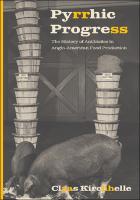Pyrrhic Progress
The History of Antibiotics in Anglo-American Food Production
Author(s)
Kirchhelle, Claas
Contributor(s)
Golden, Janet (editor)
Apple, Rina D. (editor)
Collection
WellcomeLanguage
EnglishAbstract
Pyrrhic Progress analyses over half a century of antibiotic use, regulation, and resistance in US and British food production. Mass-introduced after 1945, antibiotics helped revolutionize post-war agriculture. Food producers used antibiotics to prevent and treat disease, protect plants, preserve food, and promote animals’ growth. Many soon became dependent on routine antibiotic use to sustain and increase production. The resulting growth of antibiotic infrastructures came at a price. Critics blamed antibiotics for leaving dangerous residues in food, enabling bad animal welfare, and selecting for antimicrobial resistance (AMR) in bacteria, which could no longer be treated with antibiotics. Pyrrhic Progress reconstructs the complicated negotiations that accompanied this process of risk prioritization between consumers, farmers, and regulators on both sides of the Atlantic. Unsurprisingly, solutions differed: while Europeans implemented precautionary antibiotic restrictions to curb AMR, consumer concerns and cost-benefit assessments made US regulators focus on curbing drug residues in food. The result was a growing divergence of antibiotic stewardship and a rise of AMR. Kirchhelle’s comprehensive analysis of evolving non-human antibiotic use and the historical complexities of antibiotic stewardship provides important insights for current debates on the global burden of AMR.
Keywords
Anti Bacterial Agents; Antibiotic; food production; United States; United Kingdom; history; legislation drug; Drug resistance; microbialISBN
9780813591483Publisher
Rutgers University PressPublisher website
https://www.rutgersuniversitypress.org/Publication date and place
New Brunswick, 2020Grantor
Series
Critical Issues in Health and Medicine,Classification
History
Medicine and Nursing


 Download
Download